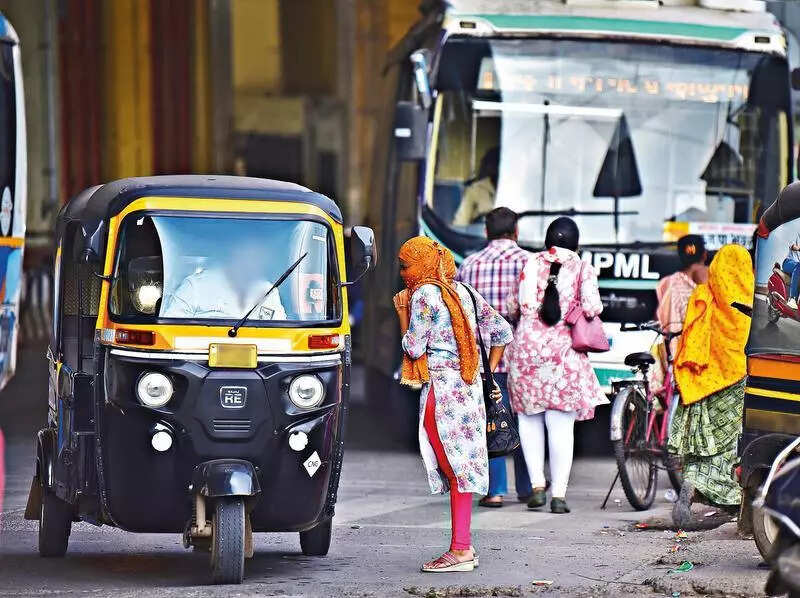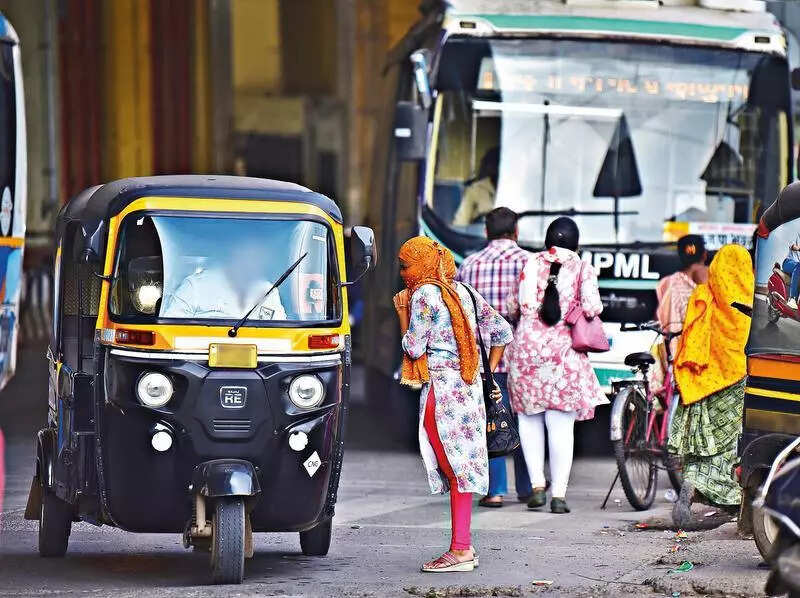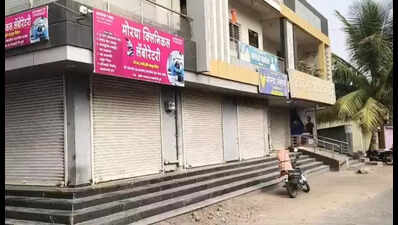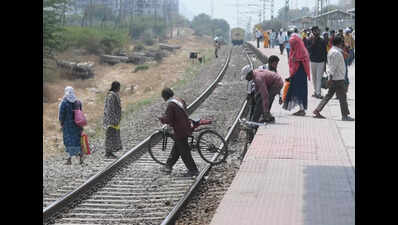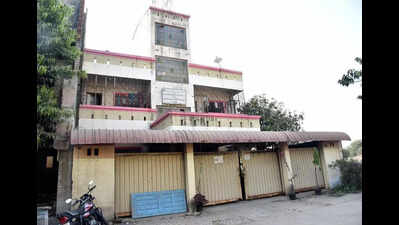As of Aug 2025, almost 5 lakh women on an average use bus services of the Pune Mahanagar Parivahan Mahamandal Ltd (PMPML) daily. To cater to this demographic, PMPML has over the years announced a slew of initiatives, like 33 women-only ‘Tejaswini‘ buses for peak hours and plans to install ‘panic buttons’ in buses since 2018. In June 2025, an undercover ‘special squad’ was deployed in coordination with city police to keep an eye on harassment cases in buses.But despite grand plans to ensure security of women using this mode of public transport, many continue to feel unsafe. For some, a general sense of rising crime is unsettling. Suman Taalje, a middle-aged working woman who travels by PMPML daily between Kondhwa and Sangamwadi, said that till a few months ago, she had not felt insecure during the routine commute. “But now, many crimes are being reported in the city, especially against women. Commuters like me feel buses should have some mechanism to send out an alert if in danger. PMPML had even proposed such an installation. What happened to it?” she asked. Nausheen Shaikh, another frequent commuter, agreed. “At least e-buses, which boast of features like CCTV cameras, should have some safety system installed. The city is witnessing many serious crimes. It is frightening and our families get worried. The introduction of safety measures will assuage fears,” the Hadapsar resident said. Many others also asked why PMPML’s seven-year-old proposal to install alert stop and panic buttons in the buses has not materialized. Asked about it, a PMPML official said, “The plan never came to fruition mainly because of Covid-19. At present, there are no plans to revive it.” The lack of such a mechanism found itself under the spotlight on occasion. On Dec 19, 2024, a video was widely shared online, showing a woman repeatedly slapping a man on board a moving PMPML bus for touching her inappropriately during an afternoon trip from Swargate to Shivajinagar. Women commuters pointed out that many such cases don’t even get reported and even in the ones that do, action is not always taken. Riddhima Sarkar, a city-based BPO professional, said, “You never know who will try to grope you in a bus. Once, while I was standing near the door, an old man crept up and tried to touch me inappropriately. When I told him to keep his distance, he claimed there was no space. Also, the conductor did nothing to help.” PMPML also employs around 220 women conductors at the moment. One of them told TOI, “We mainly work day shifts. We try to stay alert and feisty always. Things cannot be taken lightly and anything can happen anytime.” A 2012 Supreme Court judgment mandates that if a complaint of sexual harassment is raised in a moving public vehicle, the driver is to steer to the nearest police station. Failing this, their driving permit can be cancelled. Kishore Chauhan, public relations officer (PRO) with PMPML, confirmed, “If someone is caught harassing or trying to assault a woman in a bus, staff must take it immediately to the nearest police station or chowkey.” He also defended measures being taken. “Conductors are instructed to constantly announce that women can raise an alarm if needed. All buses of private contractors have CCTV surveillance and PMPML-owned buses do too, barring a few. Work is on to ensure that all buses are equipped with operational cameras. Also, all seats on the right side of buses are reserved for women. Men cannot sit there, unless the bus is running empty,” he said. But Shanti Kande, who lives in Wadgaon Sheri and often takes late evening bus home, was surprised by this response. “How can officials be so sure staff will not misbehave? Instead of assuming, they should take steps to ensure deterrence,” she said. Women’s safety in buses is a longstanding concern. In 2010, a collective of NGOs and social groups surveyed PMPML’s women passengers, in which 63% of respondents complained of sexual harassment in transit. Many said bus seats reserved for women are routinely used by men, staff ignore complaints, helpline numbers are obscured by posters, and bus stops feel unsafe due to lack of lighting, signage and poor infrastructure. Fifteen years down the line, not too much has changed. The convenience and accessibility of bus transport is marred by the vulnerability of women users. Education professional Namrata Joshi said, “There is a constant fear of being groped, stared at, or subjected to lewd comments on our daily commute. This feeling takes a toll on mental health and restricts mobility. I often cancel plans to venues too far off or too late in the night.” Another woman commuter, choosing anonymity, said, “While helplines and other measures that come into use after an incident are necessary, focus should be on prevention. Authorities must create a safe environment for women during daily commute. This includes increasing security personnel, installing CCTV cameras, conducting strict and regular background checks on staff, and conducting awareness campaigns.Safety lacking in state services, tooThe safety issue is not restricted to PMPML buses. In Feb 2025, the rape of a 26-year-old woman in a Shivshahi bus parked at the Maharashtra State Road Transport Corporation’s (MSRTC) Swargate depot sent shockwaves through the city. Thereafter, many women commuters using state transport (ST) services vocally called on authorities to ensure concrete safety systems. Niharika Goswami, who often travels between Pune and Mumbai with MSRTC, said, “Helpline numbers are visible in some buses; in others, there are none. While I haven’t faced any problems even while travelling late, the system needs improvement,” said the Kothrud resident, whose family stays in Mumbai. Abhijit Bhosle, the PRO of MSRTC, refuted, “All our buses display the number of depot managers and we are checking to make sure. Women using buses at night can ask the conductor to keep the lights on. Also, there are reserved seats for women and conductors have clear directions to take buses to the nearest police station if a woman complains.” Similarly, a senior MSRTC official said, “All our e-buses can be tracked via GPS and have a panic button which passes on information to the nearest police station.” However,” he admitted, “there is no such system as of now in the regular buses.” Skanda Neogi, another regular MSRTC bus commuter, said more needs to be done. “MSRTC can do a lot with the help of the police. Buses halt at points for refreshments and these generally have less to no security. Some steps here will be welcome,” the Kalyaninagar resident and working professional highlighted.Miles to go for all modes of transportBesides public transport like buses, reports of crimes against women and girls while travelling in autorickshaws also abound in the city. Now, some auto unions are acknowledging the issue and taking steps to address it. Measures include initiating dialogue with members to emphasise the importance of women’s safety and consequences of misconduct, besides training programmes. Keshav Kshirsagar, president of auto union Baghtoy Rickshawala, said they are holding a workshop to sensitise members on how to make women passengers feel safer. “The union also encourages women to take advantage of govt schemes and buy rickshaws to become drivers themselves. At present, around 14 women auto drivers ply with us, and mostly take trips with women passengers. However, efforts need to go beyond such categorisation. Women passengers should feel safe with male drivers as well,” he said. Shafique Patel, president of the Azad Rickshaw Association, added, “Apart from pasting a sticker with the association’s phone number in every member’s vehicle, we hold monthly meetings with members to warn them against consuming alcohol, chewing tobacco, refusing to ply, overcharging, and other misconduct with passengers. Sensitisation sessions must be held for all drivers, regardless of their gender, to ensure that they understand all aspects of women’s safety and consequences of bad behaviour.“During Ganeshotsav, usership of Pune Metro also surged, recording a footfall of close to 7 lakh on the final immersion day. Asked about safety measures taken for women passengers, Maha Metro PRO Chandrashekar Tambavekar told TOI, “We don’t look at safety as a gendered issue, but overall security of passengers is a priority. We have installed good quality CCTV cameras that capture images and audio clearly. All areas under Metro (lifts, escalators, platforms, FOBs) are all covered by CCTV surveillance. We also have staff to help passengers and even take them to the nearest police station to register an FIR if needed. If users follow protocols, it reduces chances of crowding and potential of misbehaviour.” ——————————‘Lack of safety is a systemic problem’ Safety is definitely an issue for women commuters using public transport. It becomes a bigger issue when there is overcrowding and conductors may not be able to pay attention to all passengers. I know of several women who have had bad experiences and now choose not to travel by bus at all. It is important to understand that while using public transport, safety is not necessarily segregated gender-wise. It is a systemic issue, in the sense that people must understand it’s not right to harass fellow passengers of whatever gender — Madhushree Kulkarni | Founder, BusKara, a collective promoting public transportBetter infrastructure design, like proper lighting, transit hub designs and clean toilets, alongwith a Gender Action Plan that acknowledges women have different travel needs than men are all crucial systemic changes that must be implemented to enhance commuter safety. For example, PMPML has some standard protocols like seat reservation and the right of women to take the bus to the nearest police station in case of harassment, but what they need to look into is the entire commute experience, from getting to a bus stop to getting off a bus, from a woman’s perspective — Shweta Vernekar | Senior programme associate, Parisar——————————Unwelcome advances a common occurrenceAs I tried to hail a bus from Sadashiv Peth to FC Road, a man aged 28-35 kept trying to talk to me, despite being ignored. Scared, I got into the next bus although it was going to a different destination. He followed me in and persisted. I got off at the next stop and ran. Fortunately, he couldn’t get out in time. I can’t stop using public transport because as a student, the private alternative is unaffordable. But I have become extra cautious now — Student | 23 years oldSome men try to take advantage of peak-hour traffic to brush up against women while travelling in a bus. This has happened with me a few times. I tend to shout, asking them to maintain a distance or stand properly. Once, a man kept trying to touch me, but moved away after I shouted. The same issue arises even while seated next to a man. Ironically, I always felt safe travelling at night in a PMPML bus, when the crowd is minimal— Visual artist | 32 years oldReturning to Kothrud from Dhole Patil Road, a man on a bus touched me inappropriately. I froze, but a senior citizen shouted at him to leave. I was relieved, but then the elderly man himself became overfriendly. I panicked, disembarked and jumped into a rickshaw. He caught up and began accusing me of being rude, even though I just wanted to leave. I was terrified that someone I trusted had turned into a predator — College student | 20 years old——————————






